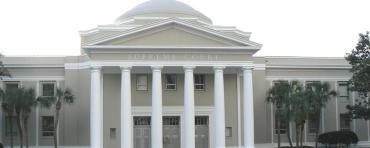
Florida Supreme Court Justice Barbara Pariente, more than once Tuesday, advised lawyers that arguments about a proposed constitutional amendment to expand the use of solar energy leaned toward campaign rhetoric rather than key legal issues.
Still, when justices finished hearing arguments about ballot language proposed by the group Floridians for Solar Choice, supporters and opponents of the controversial initiative emerged from the Supreme Court offering positive spins.
Opponents, including the state's largest power companies and the office of Attorney General Pam Bondi, argued that the ballot proposal is misleading and would create chaos in state and local regulations.
Proponents of the amendment, meanwhile, believe that justices --- based on the court's questions and comments Tuesday --- will agree the initiative can be placed on the November 2016 ballot if enough signatures are collected.
"I think they were much more skeptical of their (opponents') arguments than ours," said Stephen Smith, executive director of the Southern Alliance for Clean Energy, which is the biggest backer of Floridians for Solar Choice. "I think the judges understood what we're trying to do, and I think that while they might not agree wholeheartedly with the policy implications, their job was to focus on the language and let the voters decide. And I think we cleared that hurdle."
The Floridians for Solar Choice amendment, in part, would allow businesses to generate and sell up to two megawatts of power to customers on the same or neighboring properties. Two megawatts have been estimated as providing the daily needs of a typical Wal-Mart or residential communities between 225 and 714 homes.
The court will have to decide if the proposed ballot language is limited to a single subject, the wording is unambiguous and that the summary meets a 75-word limit. If the court signs off on the wording, Floridians for Solar Choice would need to submit a total of 683,149 valid petition signatures to get on the ballot.
The Supreme Court is not supposed to weigh the merits of proposed constitutional amendments --- which spurred the comments Tuesday from Pariente.
"It seems to me what you're arguing is why the voters shouldn't approve it," Pariente told Barry Richard, an attorney for Florida Power & Light, Duke Energy Florida, Gulf Power and Tampa Electric. "It talks about a certain amount of power … and it talks about contiguous or on the property supplying it. Whether it will upend the entire electric power structure in Florida or not seems to be merits of the proposal, not that it (the ballot language) is misleading."
Matthew Carter, a leader of the opposition group Consumers for Smart Solar and a former Public Service Commission chairman, said after the arguments that the justices could go either way in their ruling, though he acknowledged they have recently allowed such proposals to proceed "unless it's so egregious."
State Solicitor General Allen Winsor, representing Bondi, argued that the amendment would change the definition of utilities that require Public Service Commission oversight and that it is ambiguous about the future impact on consumer electric rates.
Also, Stephen Grimes, a former Supreme Court justice representing the Florida Electric Cooperatives Association, argued that the ballot summary fails to apprise voters that a small solar supplier could "totally ignore health safety regulations and building code regulations."
But Justice R. Fred Lewis said only so much can be squeezed into a 75-word summary and that there doesn't appear to be "phraseology" that the most-significant items must be included.
Florida Chamber of Commerce Executive Vice President David Hart said it is difficult to predict how justices will rule based on their questions. The chamber, which filed a brief opposing the proposed amendment, is generally against the use of constitutional amendments as a way to make laws when other avenues --- such as through the Legislature --- are available.
But Smith, of the Southern Alliance for Clean Energy, said such avenues don't appear to be available with the current makeup of the Republican-dominated Legislature.
"If the political process in Tallahassee was functioning, we could do this through the Legislature," Smith said. "But because of the dysfunction and because of the heavy influence that the utilities have across the street here in the Legislature, the only way to win this is to take it directly to the people."


